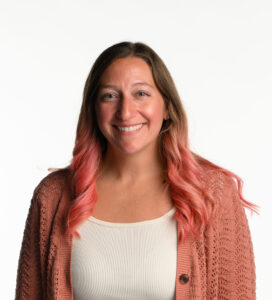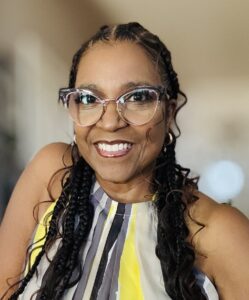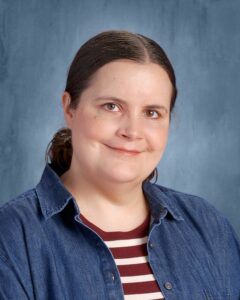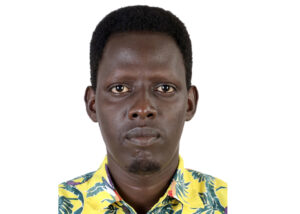
View current election timeline here.
2026-28 term slate of candidates
Director-at-large (1 position)
- Michelle Coro | Mountain Pointe High School | Phoenix, Arizona
- Sarah Kirksey | Ladue Horton Watkins High School | St. Louis, Missouri
Scholastic Press Rights Director (1 position)
- Andrea Negri | Cypress Wood High School | Cypress, Texas
- Joseph Runyambo Gasinzira | Isoko Complex School | Minembwe, Democratic Republic of Congo
Candidate statements
Candidate for Director-at-large
Michelle Coro, Mountain Pointe (Phoenix) High School
Why do you want to serve, and how will you help advance JEA’s mission?
I aim to serve JEA as a Director-at-Large because I’ve been a longtime supporter of the organization and its mission to empower student journalists and their advisers. I believe in the transformative power of scholastic journalism — how it builds confidence, sparks curiosity, and strengthens communities. Organizations that advocate for scholastic journalism have guided my career, and now I want to give back to help JEA continue advocating for students and advisers.
Today, journalism is under scrutiny, and DEI efforts are facing resistance. Students are learning to tell stories in a world that sometimes undervalues truth and representation. I want to help ensure JEA remains a place where advisers and students from all backgrounds feel seen, supported, and empowered.
As an advocate for students and advisers of color, I’ve witnessed the power of mentorship and visibility. When students feel safe to tell their stories, journalism thrives. I want to help create those spaces where advisers gain confidence and students find the courage to tell meaningful, authentic stories.
Serving as a Director-at-Large would allow me to listen, amplify diverse voices, and collaborate with others who are passionate about protecting scholastic journalism. My goal is to help JEA remain not just an organization, but a movement— one that champions truth, nurtures inclusion, and equips educators to guide the next generation of fearless storytellers.
What do you think is the greatest challenge facing scholastic journalism education today?
The greatest challenge today is the erosion of trust in journalism and the barriers that make it harder for students and advisers to do their work freely. Truth is questioned, press freedom is challenged, and programs are often undervalued or underfunded. These pressures can make students hesitate to take risks or tell important stories.
As an adviser, I’ve seen students pause because of fear, and administrators struggle to see the value of student journalism. These moments remind me how fragile this work can feel and how critical it is to protect and support student voices.
Another challenge is ensuring that journalism reflects the diversity of our schools. Students and advisers of color need to see themselves represented. Without their voices, journalism is incomplete, and countless stories go untold.
Advisers teach reporting, design, ethics and courage. Students need to know their voices matter, and that telling the truth, even when it’s hard, is an act of integrity and hope. Scholastic journalism is one of the few spaces where young people can think critically, question authority, and engage with the world. Supporting it is investing in the next generation of courageous storytellers.
Why do you believe your voice is an important voice or perspective that needs to be heard?
My voice matters because it comes from decades of experience — 30 years as an educator and adviser in student newspapers, broadcast, film, and graphic arts media, along with professional experience in print and broadcast journalism. I’ve seen how storytelling transforms students, giving them confidence, perspective, and a platform to be heard. That combination of professional insight and classroom experience gives me a perspective that is practical and personal.
I’ve guided students who were hesitant to publish and advisers who navigate challenging programs. I understand the craft of journalism and the courage it takes to do it well in today’s climate. I’ve also worked to ensure students and advisers of color feel represented and supported.
My voice matters because I can speak to both craft and advocacy, helping protect programs, mentor advisers, and empower students to tell authentic stories. I want to ensure that every student, adviser, and story has the support, guidance, and recognition it deserves so that scholastic journalism remains a space for courage, truth, and inclusion.
Candidate for Director-at-large

Sarah Kirksey, Ladue Horton Watkins (St. Louis) High School
Why do you want to serve, and how will you help advance JEA’s mission?
When I think about my job and what I get to do every day, the stress and anxiety from all of the deadlines, publicity, or pressure isn’t what comes to mind–it’s the students I get to work with and the friends I have made through JEA that are at the heart of what I do.
I first started advising 12 years ago, and I was incredibly fortunate to have veteran advisers around me who truly cared about scholastic journalism, not just in their own schools, but in every school where there was a journalism program. This sense of camaraderie, that we are all in this chaos together, that I am not alone in what I am going through with an overly-aggressive parent or yearbook staffer who just simply won’t do anything, this is what I love about JEA. I think the Journalism Education Association fills a massive void in the world of scholastic journalism by connecting us all, and I would be honored to help with that goal in any capacity.
I love meeting and working with new advisers. I love problem solving and coming up with creative solutions. I am not afraid to try new things, and I would much rather trial and error a solution to an issue than wait around for someone else to fix it. I like to get things done, and I think that mentality would be helpful in such a prestigious, important association as JEA.
What do you think is the greatest challenge facing scholastic journalism education today?
In this current moment, while there are countless threats to both professional and scholastic journalism, I think the most pressing challenge facing today’s student journalists and advisers is the pressure on administration and school districts to not allow their schools to cover controversial or political topics. Since the 2016 election and COVID, society has grown increasingly polarized and community and parental groups scour almost everything districts produce and post, including student media. We have seen highly respected, top-notch advisers fall victim to this hyper-vigilance as those who don’t understand the purpose of the press attack student publications to further their own agendas.
This fearmongering inevitably leads to self-censorship, and in worse cases, prior review and restraint or dismissal of advisers or disbandment of student media. Topics that we may have broached 10 years ago with some caution and due diligence now make our stomachs turn in fear.
I would love to be a part of finding solutions to this issue and informing our communities and administrations on the value of scholastic journalism and the necessity of diligent, ethical journalism within our society. We don’t want publications simply producing product reviews and fluff stories while government officials and those who run our society go unchecked, and that kind of attentiveness needs to start at the scholastic level.
Why do you believe your voice is an important voice or perspective that needs to be heard?
After advising for 12 years, I feel like I am in a good middle position between new adviser and seasoned adviser. I have a strong understanding of what makes a scholastic publication successful and useful to the community. I have experience with a variety of student media, including yearbook, newspaper, newsmagazine, literary magazine, social media, feature magazine and news website.
I have worked hard to develop a positive relationship between our administration and our student journalists, and I believe I could help others do so as well. When I took over my program, it was hard to get teachers and community members to agree to be interviewed because our reputation wasn’t the best, but I worked with my students to build a program that is respected and valued within our community.
I have attended every JEA national convention available to me in my 12 years of advising, I spend my summers teaching and attending summer journalism workshops, and I truly feel I am prepared to take on a role like director at large.
If elected, I would love to help my fellow advisers and student journalists further develop their programs in a way that best serves their communities while covering important issues.
Candidate for Scholastic Press Rights Director
Andrea Negri, MJE, Cypress Wood (Cypress) High School
Why do you want to serve, and how will you help advance JEA’s mission?
When I was getting my masters through Kent State’s journalism education program, I got bit by the student press rights bug. I was kind of shocked by what I didn’t know – and I thought I should help educate others. I have advocated for student journalists and their advisers at multiple levels, from contacting school boards to writing letters to the editor to presenting at state and national conventions. In addition, I want to continue to collaborate with some of the smartest people I know. I don’t have all of the answers to the challenges in scholastic journalism, but I’ve learned since becoming involved with the SPRC that when we put our heads together, we can come up with some pretty good solutions. My work for the last 18 months has focused on supporting advisers and students, educating the public on what we do and its importance and looking for new solutions to challenging times. I will continue to help support those aspects of JEA’s mission regardless of how this election turns out.
What do you think is the greatest challenge facing scholastic journalism education today?
Scholastic journalism faces the same challenges the nation does at the moment: Challenges to our First Amendment freedoms. It ranges from limitations on academic freedoms to pressure on the professional media to new legislation that impacts what our students can and can’t do. The difficult part about this challenge is it requires pushback – which holds the risk of personal or professional consequences. Fighting is hard, but if we don’t, those freedoms can continue to be whittled away. One of my students recently said, “If we don’t stand up now, what stops them from coming back and adding other demands later?”
Why do you believe your voice is an important voice or perspective that needs to be heard?
I’ve been in the shoes of the students and advisers we help more times than I can count. When I was a high school student, I experienced prior restraint and censorship and had to navigate it as a student editor. Two days after my first term as SPRC director started, my yearbook was in the New York Post for its content and I had a principal challenging my students’ integrity and press freedom. I’ve worked in three districts and student journalists in all three districts have contacted the SPLC for support. I believe it is important for someone in this position to be willing to practice what they preach, and I do that. It is challenging and scary – but I’m not going to ask an adviser or student to do something I’m not willing to do myself.
Candidate for Scholastic Press Rights Director
Joseph Runyambo Gasinzira, Isoko Complex (Minembwe) School
Why do you want to serve, and how will you help advance JEA’s mission?
I am Joseph RUNYAMBO, a journalist trainer and Executive Director of Child and Youth Care Organization (CYCO). I am deeply passionate about promoting community journalism in rural schools in the Democratic Republic of Congo (DRC). The eastern provinces of North and South Kivu have endured decades of armed conflict, causing widespread displacement, disrupted livelihoods, and severe impacts on women and girls, who are often victims of sexual and gender-based violence used as a weapon of war.
Growing up and working in this environment, I have witnessed how trauma, limited access to education, and systemic inequality silence young voices, particularly girls. Many are denied access to technology, online learning, or platforms to share their experiences, leaving them vulnerable and excluded from community decision-making.
Building on my experiences during my scholarship at One World Network of Schools (https://www.oneworldnos.org/ ), I now lead the SIKILIZA Project in Eastern DRC. Through this initiative, I train young female students in community journalism, strengthen the capacity of local radio journalists, and amplify their voices in advocating for their education, health, and protection. I am committed to empowering youth through ethical reporting, storytelling, and advocacy, ensuring marginalized communities can tell their own stories and access critical information. You can read more about me through my LinkedIn profile here: https://www.linkedin.com/in/joseph-runyambo-2161a4232/
If elected to the JEA Board of Directors, I will bring a global perspective grounded in frontline experience, a commitment to scholastic journalism education, and a strong dedication to service. I am eager to contribute my skills, learn from diverse peers, and help steward initiatives that expand opportunities for young journalists worldwide. My goal is to foster inclusive, responsible, and courageous journalism that inspires social change and amplifies the voices of those too often left unheard.
What do you think is the greatest challenge facing scholastic journalism education today?
I believe the greatest challenge facing scholastic journalism education today is the limited access to journalism opportunities for students from rural areas and low-income countries, despite the proven power of media to influence community behavior and development. Ensuring that these students develop both the skills and ethical grounding to navigate an increasingly complex media landscape must be a priority.
With the rise of social media, misinformation, and rapidly spreading digital content, young journalists must learn not only how to report accurately and compellingly, but also how to think critically, verify sources, and consider the broader social impact of their work.
Access to quality journalism education is often uneven. Many schools, especially in rural or under-resourced areas, lack trained instructors, up-to-date resources, or safe platforms for students to practice reporting. This inequity limits opportunities for students particularly those from marginalized communities to develop their voices and participate fully in civic life.
To address these challenges, scholastic journalism programs must prioritize ethical reporting, critical thinking, media literacy, and inclusivity, while providing practical tools and mentorship. By equipping students to report responsibly and confidently, we empower them to become informed citizens and advocates for truth in their communities.
Why do you believe your voice is an important voice or perspective that needs to be heard?
I believe my voice is important because it comes from the frontlines of communities often overlooked in mainstream media — rural areas of Eastern DRC and everywhere around the world, where conflict, poverty, and gender-based violence have silenced many voices, especially those of girls and young women. Having grown up and worked in this environment, I have witnessed the struggles, resilience, and untold stories of youth navigating these challenges.
As a journalist trainer and Executive Director of the Child and Youth Care Organization (CYCO), I amplify these stories through community journalism, equipping young people with the skills, ethical grounding, and platforms to share their experiences. My perspective bridges local realities with global conversations, highlighting the intersection of education, media, and social change in fragile contexts.
I believe hearing voices from such environments is crucial to understanding the broader human impact of conflict, inequality, and systemic barriers. By sharing these perspectives, we not only inform the world but also empower youth to tell their own stories, foster accountability, and inspire action. My voice is a bridge between marginalized communities and the wider world, advocating for inclusion, equity, and ethical storytelling.






